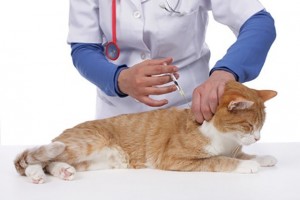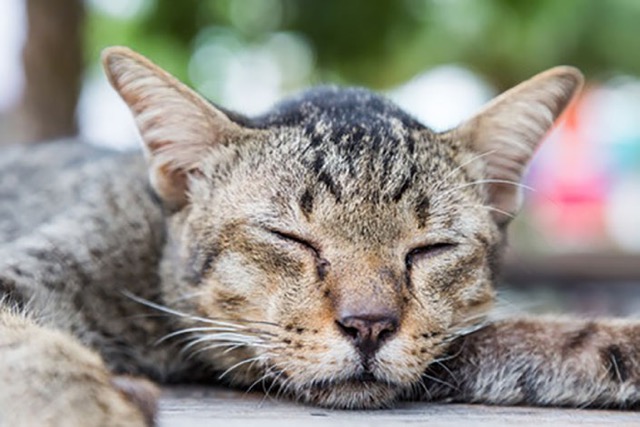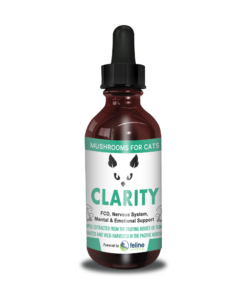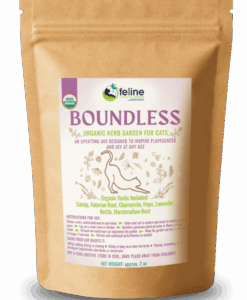Your cat is slowing down. He used to jump from counter to counter, sofa to love seat, dresser to bed, etc. but now he just sits on the ground and looks at you with those sad eyes. “I wish he could just talk!” you say to yourself… Vet visits are expensive and you don’t know if there is actually something wrong with him or if age is just starting to settle in.
We understand.
Cats mask pain pretty well. They don’t usually cry or seem abnormal in their ‘cattitude’ – but kitty parents, like all parents, still worry. If your cat is beginning to slow-his-role and you’re getting concerned, please read below to see the top 10 reasons that cats slow down.
1. Lack of Nutrition
I’m listing this as number one because it is the most common factor in cat joint issues and relates closely to all the rest as well (forgive me if I sound redundant – this knowledge comes first hand). Just like us, if cats aren’t getting the nutrients their bodies need then their bodies won’t function well. When we hit our thirties we start to take supplements and do our best to eat at least a few healthy meals per week. Cats, on the other hand, only ingest what we put in their cat bowl. Look at the ingredients. If you see “filler, by-products, filler and more filler” then you’re feeding them the equivalent of what your diet would be if you ate shoes for protein and drank beer for carbohydrates. Make sure that your cat is getting high quality protein in his diet – do your research on what “high-quality” really means – and be leery of a long list of ingredients that you can’t understand.
2. Injury
As I said earlier, cats do a good job at masking pain… Because they are curious creatures and like to explore every crevice of the household, it is easy for them to over-jump their boundaries and sprain or strain a muscle or tendon (again, with the right nutrition it will be more difficult for this to happen). If your cat suddenly goes from rambunctious to slow, it is possible that he has hurt himself in some way. Keeping joint support supplements nearby and/or making your own joint support treats will speed up the healing process.
3. Osteoarthritis
The gradual wear and tear of joints, over time, can cause what the veterinarians diagnose as “osteoarthritis” in cats. This is a broad term, in my opinion, as statistics show that up to 90% of cats will suffer from this problem. The truth, however, is that they shouldn’t. Our oldest cat (almost 19 in human years) has absolutely no problems with jumping, running, chasing the string, etc. because we feed him healthy foods and give him joint supplementation on a daily basis. Remember, “disease” is just that….dis ease (not at ease). Don’t let a diagnosis rule your cat…or yourself for that matter.
4. Dysplasia
This problem occurs in the hips of cats (called hip dysplasia) and is thought to be genetic in nature – it’s also pretty rare in cats. Basically, the ball and socket of the hip joints don’t fall into place and causes joints to rub painfully against each other. Again, don’t let this diagnoses rule your cat. We have seen several cats who have overcome hip dysplasia fairly quickly with the right nutritional support.
5. Constipation
Yes, constipation. And yes – as you may well personally know – it’s an uncomfortable thing. You likely didn’t feel like going for a jog or even running your usual errands if your were dealing with this affliction. While constipation in cats is actually pretty rare, it’s worth paying attention to his bathroom visits. Here (again) bad nutrition and dehydration is often the culprit… and good nutrition and hydration can also solve this issue naturally – much as it does for us.
Another cause of constipation to consider is painful joints. Follow me here… it can become a painful ordeal to use the ‘restroom’ if your can is suffering from joint pain. As the clean and tidy creatures they are, this can often lead to ‘holding it’… and yes – this will cause constipation. If you notice your cat having trouble climbing the stairs or no longer jumping onto his favorite place on the couch, it’s a good bet that the litter box may have also become an unwelcome obstacle. Start by trying a low-cut box just to help his comfort level – then, you guessed it – get a good joint supplement to help alleviate the real problem. You may also want to check into some digestive nutritional support – but many times just easing the pain with the right joint support in addition to making his litter box more accessible is the perfect fix.
6. Illness
When a cat is sick he will usually slow down. Pay attention to other signs like vomiting, diarrhea, refusal to eat or hovering over the water bowl. If you see any of these other symptoms then make an appointment with your vet. The problem may not have anything to do with his joints – it may just be his way of telling mama/daddy that he doesn’t feel well.
7. Vaccine Reaction
 If you are seeing your cat slow down or seem lethargic after getting vaccinated, this could be a reaction to the vaccination. Immediate response to the vaccines are fairly normal – being that they just had a live virus pumped into their small little body – but should not last long. Cases that are more severe usually result from many different vaccinations being administered all at once (or “combo shots”). Knowledgeable vets won’t do this, but there are still some out there that prefer the quick and expensive style vaccinations. If you see the symptoms persist for more than 24 hours, call your (or a different) vet. Nutritional support in these cases have shown tremendous results as well.
If you are seeing your cat slow down or seem lethargic after getting vaccinated, this could be a reaction to the vaccination. Immediate response to the vaccines are fairly normal – being that they just had a live virus pumped into their small little body – but should not last long. Cases that are more severe usually result from many different vaccinations being administered all at once (or “combo shots”). Knowledgeable vets won’t do this, but there are still some out there that prefer the quick and expensive style vaccinations. If you see the symptoms persist for more than 24 hours, call your (or a different) vet. Nutritional support in these cases have shown tremendous results as well.
I know I sound redundant regarding nutrition in cats. From my personal and professional experience in pet nutrition over the past 10 years, I’ve found that the statistics of cat’s joint problems are, almost always, directly proportional to their nutrition levels. My best example is my own Mr. Bittles. At the age of 2 he no longer wanted to jump on the couch or bed. At the time, I wasn’t at all conscientious of the ingredients in the food I was feeding him… Honestly, I just picked up whatever was within my budget at the grocery store. Once I began to research and learn more about cat nutrition I was appalled at myself as a pet parent. It took less than one month of feeding him high quality food and a little nutritional support before he was running, jumping and playing with us again. 10 years later and he’s still just as active.
Support for Cats the are Slowing Down





Recent Comments